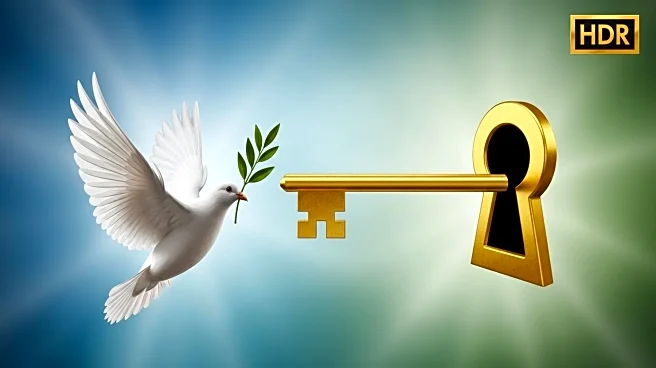What's Happening?
Prime Minister Benjamin Netanyahu announced that Israel is prepared to cooperate with President Trump's plan to end the ongoing conflict in Gaza. This development follows a statement from Hamas indicating its willingness to release all Israeli hostages under certain conditions. The Trump plan, which was presented in Washington alongside Netanyahu, includes the demilitarization of Gaza and the release of hostages contingent on Israeli forces' withdrawal. Hamas has agreed to the terms for ending the war, which also involve the release of Palestinian prisoners by Israel. The Israeli military has been instructed to prepare for the implementation of the first phase of the plan, focusing on the release of hostages while maintaining readiness to neutralize any threats.
Why It's Important?
The agreement between Israel and Hamas, facilitated by President Trump's plan, could mark a significant turning point in the long-standing conflict in Gaza. The potential release of hostages and prisoners could ease tensions and pave the way for peace negotiations. This development is crucial for regional stability and could have broader implications for U.S. foreign policy in the Middle East. The cooperation between Israel and the White House underscores the influence of U.S. diplomacy in resolving international conflicts. However, the success of the plan hinges on the willingness of both parties to adhere to the conditions set forth, which could impact future relations and peace efforts in the region.
What's Next?
The next steps involve indirect talks between Hamas and Israel to discuss the conditions for the exchange of hostages and prisoners. The Israeli military is advancing its readiness to implement the plan, while ensuring rapid response capabilities to address any emerging threats. The international community will be closely monitoring the situation, as the successful execution of the plan could lead to further diplomatic engagements and potentially a lasting resolution to the conflict. Stakeholders, including political leaders and civil society groups, may react to the developments, influencing the trajectory of peace efforts in the region.
Beyond the Headlines
The ethical and legal dimensions of the hostage and prisoner exchange are significant, as they involve complex negotiations and humanitarian considerations. The long-term implications of the plan could reshape the geopolitical landscape in the Middle East, affecting alliances and power dynamics. The cultural impact on the affected populations, particularly in Gaza, could lead to shifts in societal attitudes and future governance structures. The role of U.S. diplomacy in facilitating such agreements highlights the importance of international cooperation in conflict resolution.









